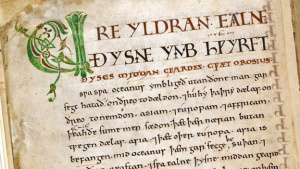Language/Old-english-ca-450-1100/Vocabulary/Family
Hi Old English (ca. 450-1100) learners! 😊
In this lesson, we will learn about the family and its members in Old English (ca. 450-1100). As always, we will include cultural insights and interesting facts to make the lesson more engaging! Don't forget to use the Polyglot Club to find native speakers and ask them any questions. To improve your vocabulary further, check out the Vocabulary section in the Old English (ca. 450-1100) language page. Let's begin! 📖👨👩👧👦
Family Members[edit | edit source]
Family was an essential structure in Old English (ca. 450-1100) society. The family structure determined social status and inheritance. Therefore, knowing the different family members' names and their roles is an essential part of understanding Old English (ca. 450-1100) culture.
Here is a list of different family members in Old English (ca. 450-1100):
| Old English (ca. 450-1100) | Pronunciation | English |
|---|---|---|
| faeder | /ˈfadɛr/ | father |
| modor | /ˈmodor/ | mother |
| sunu | /ˈsunu/ | son |
| dohtor | /ˈdoxtor/ | daughter |
| broþor | /ˈbroðor/ | brother |
| sweostor | /ˈsweostor/ | sister |
| sunu-bearn | /ˈsunu-bǣarn/ | grandson |
| dohtor-bearn | /ˈdoxtor-bǣarn/ | granddaughter |
| aldor-leof | /ˈaldor-lǣof/ | beloved parent(s) |
In Old English (ca. 450-1100) society, lineage and heritage were of great importance. The words aldor-leof, meaning "beloved parent(s)" were often used to show love and respect towards one's parents.
Dialogue[edit | edit source]
To see the family members in context, let's create a dialogue:
- Person 1: Faeder, ic eom her. (Father, I am here.)
- Person 2: Hal wes thu, min sunu! (Hello, my son!)
- Person 1: Modor, hwær eart thu? (Mother, where are you?)
- Person 2: Ic eom on wealda. (I am in the fields.)
- Person 1: Broþor, maegst thu me helpan? (Brother, can you help me?)
- Person 2: Ja, ic mihte. (Yes, I can.)
- Person 1: Sweostor, ic lufie þe. (Sister, I love you.)
- Person 2: And ic lufie þe eac. (And I love you too.)
Interesting Fact[edit | edit source]
Did you know that the Old English word for 'family' is 'fæderen' which means 'relationship by father' or 'paternity'? This is because family structure in Old English (ca. 450-1100) society was based around the father figure.
Sources[edit | edit source]
➡ If you have any questions, please ask them in the comments section below.
➡ Feel free to edit this wiki page if you think it can be improved. 😎
Other Lessons[edit | edit source]
- Education
- Feelings and Emotions
- How to Say Hello and Greetings
- Express Surprise
- Animals
- Count to 10
- Health
- Food
- Geography

